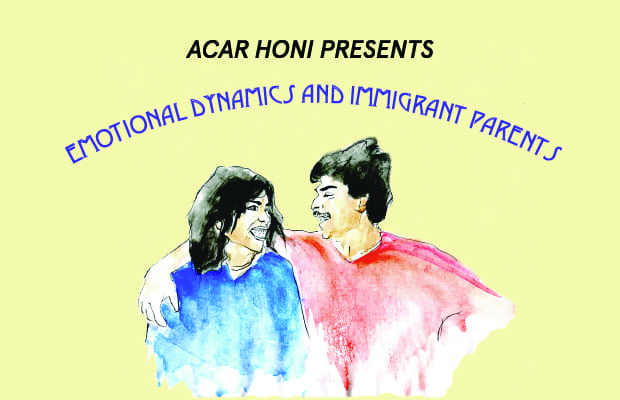My visits to my mother’s family home in India delighted me when growing up, which is as gargantuan as you’d imagine a house to over twelve people would be. Lovingly named ‘Gharonda’, it held my maternal cousins, uncles and aunties, as well as my grandparents; a typical joint family household. My mother weaves me tales of her adolescence — sharing everything, including a bed, with her sisters until they each got married.
These days, I chastise my mother for being able to spend limitless hours on the phone with her older sister everyday; counselling, gossiping, exchanging recipes and plotting. They are separated by several oceans but my mausi (aunty) can recount each meal our family has eaten, every argument we’ve had, all the way from India.
It isn’t hard to understand why my parents cannot merely trade in their collectivist upbringings to the individualistic ones of Western society. Holding onto every tangible aspect of their earlier lives, which were largely embedded in a sense of unity and community, is the foundation upon which they have built our lives in Australia, and the values they refer back to in rearing the household.
However, for all the joys that a close-knit family can offer, there is often a large divide between myself and my parents. I’ve found this disconnect evident in how brown families treat issues that are still seen as ‘taboo’; we fall short in our treatment of sexuality, queerness and sexual assault among other topics. In particular, we fail miserably at discussing mental health.
From experience, brown families exhibit a notable lack of nuance in the discourse surrounding mental health. Often present is the deluded belief in a dichotomy for mental health, where one is either ‘normal’ (or completely mentally stable all the time) or ‘crazy’ (affected by any sort of mental health issue that isn’t easily digestible or explainable). We aren’t given the right tools to properly and adequately deal with many strains on mental health, and we are taught to idealise and aspire to stoicism. This completely neglects the reality that a large number of people can and will be affected by mental health issues within their lifetimes, whether it be short-term stress or long-term issues like depression or anxiety.
As such, a stigma has been built around mental health issues, to the point where those being affected often go undiagnosed. This is for fear that reaching out for help may bring invalidation or ostracisation from their family, not necessarily brought upon by a lack of love or empathy, but by a clear difference in education and perceptions of the issue, owing in large to differing upbringings.
I have never seen my father cry. My family has been through extremely trying times, and spent the larger part of almost six years frequenting hospitals, and yet not once did I see my father externally express his disillusionment. This is not to say that I’d ever want to see my loved ones upset. However, I know there was significant mental duress that fell onto my parents’ shoulders, and whilst my mother had outlets for her grief, I saw my father internalize a great deal of his. This is a trend that I have seen mirrored in all the male figures in my family, and, for the most part, our community. Men, in particular, are taught to believe that masculinity lies within their ability to present and act as the strong, stoic head of the household. They are urged to internalise emotions so as to not be seen as ‘feminine’ or ‘weak’, with the synonymy of those qualities speaking lengths about the role of misogyny in how brown families approach mental health issues.
In the end, it all comes back to the issue of us prioritising how we are perceived by our community, because our collectivist mindset means everyone must take this into account. When our ‘image’ becomes the centre of the discussion we have about mental health, our needs can be glossed over and hushed up for fear of them becoming a topic of gossip. When the good intentions of families are superseded by the need to maintain one’s image in the community, we lose the opportunity for productive discourse and learning experiences about mental health.
In an ideal world, the collectivism of Indian families would provide a network of caring and supportive family members. However, when the norm is for every personal decision you make to be up for debate by your extended family and community back home, it inevitably feeds back into a culture where our lives are something that is up for debate and that everyone is entitled to an opinion on. It is important to consider how this is especially toxic for those already dealing with internal conflict and anguish.
It is also critical to understand that critiquing or rejecting certain patrilineal, familialistic notions present in traditional Indian family structures does not make me any less Indian. Meaningfully engaging with my culture should not have to mean blindly internalising values, regardless of how toxic they may be, but should mean that I’m able to unlearn and criticize much of what we’re taught is to be revered about our culture in order to self-determine.
It is time we dismantle the long-standing shame and stigma surrounding issues of mental health and other seemingly hard-to-stomach topics in our communities, and pick apart the notion that our worth is based on how well we fit the mould of ‘sanskari’ brown children. Challenging counterproductive cultural habits that actively harm our own livelihood is nothing to be ashamed of.





